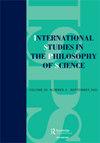欧内斯特·纳格尔的归约模型与理论变革
IF 0.8
2区 哲学
Q2 HISTORY & PHILOSOPHY OF SCIENCE
International Studies in the Philosophy of Science
Pub Date : 2023-01-02
DOI:10.1080/02698595.2023.2204792
引用次数: 0
摘要
摘要对欧内斯特·纳格尔的归约模型的一个长期批评是,它没有考虑到理论的变化。这种批评建立在公认的观点基础上,即纳gelian约简与理论变化不相容。这篇文章挑战了公认的观点,表明纳格尔的模型可以很容易地适应理论的变化。事实上,Nagel的模型本质上是静态的,因为它只给出了不变的形式和非形式的还原条件;相比之下,理论变革属于科学的动态史;因此,将纳格尔模型应用于不同历史时期的科学知识,产生了一系列不同程度还原成功的纳格尔还原。通过考虑十九世纪末将热力学简化为统计力学的事业,可以说明纳格尔对理论变化的处理。也有人认为,在处理理论变化方面,Nagel的模型比随后的模型(以Kenneth Schaffner的一般约简替换模型为例)具有更大的优点。本文的结论是,纳格尔的归约模型处理理论变化的方式与逻辑经验主义处理历史主义的方式完全相同。本文章由计算机程序翻译,如有差异,请以英文原文为准。
Ernest Nagel's Model of Reduction and Theory Change
ABSTRACT A longstanding criticism of Ernest Nagel's model of reduction is that it fails to take theory change into account. This criticism builds on the received view that Nagelian reductions are incompatible with theory change. This article challenges the received view by showing that Nagel's model can easily accommodate theory change. Indeed, Nagel's model is essentially static as it only gives unchanging formal and nonformal conditions for reduction; in contrast, theory change belongs to the dynamic history of science; as a result, the application of Nagel's model to scientific knowledge from different historical periods yields a series of Nagelian reductions of different degrees of reductive success. This Nagelian treatment of theory change is illustrated by considering the enterprise of reducing thermodynamics to statistical mechanics in the late nineteenth century. It is also contended that, in handling theory change Nagel's model has greater merits than subsequent models (exemplified by Kenneth Schaffner's general reduction-replacement model). This article concludes by suggesting that Nagel's model of reduction deals with theory change exactly in the same way as logical empiricism does with historicism.
求助全文
通过发布文献求助,成功后即可免费获取论文全文。
去求助
来源期刊

International Studies in the Philosophy of Science
HISTORY & PHILOSOPHY OF SCIENCE-
自引率
12.50%
发文量
10
期刊介绍:
International Studies in the Philosophy of Science is a scholarly journal dedicated to publishing original research in philosophy of science and in philosophically informed history and sociology of science. Its scope includes the foundations and methodology of the natural, social, and human sciences, philosophical implications of particular scientific theories, and broader philosophical reflection on science. The editors invite contributions not only from philosophers, historians, and sociologists of science, but also from researchers in the sciences. The journal publishes articles from a wide variety of countries and philosophical traditions.
 求助内容:
求助内容: 应助结果提醒方式:
应助结果提醒方式:


